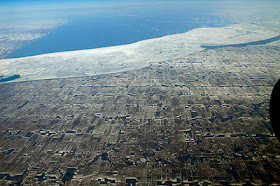(This post originally appeared on Sustainablog on 2/28/11. For links to all my posts click here)
The other day I made a comment on a blog post that had quoted an article I wrote about the surprisingly tiny scale of Organic farming. In describing "conventional agriculture," that author had used the term "chemical laden farming," which I pointed out was misleading considering the USDA data which documents how miniscule chemical residues actually are on our food. Someone else responded to that comment, saying that it is "sad that farmers today are more into the 'easy money' sort of farming and not being concerned with the benefits of their products." As someone who has been deeply involved in agriculture since 1977, it makes me angry to see someone making such an unfair assertion about the farming community. It also makes me sad that, not just this person, but a great many others, have never had the opportunity to know farmers or to understand the challenges that they face to provide us with food. Their vitriol can only spring from a lack of real perspective.

Perspective
Last week I had the opportunity to speak at the Ontario Fruit and Vegetable Growers Convention in St. Catherine's, Southern Ontario. This is a region with a highly diversified fruit, vegetable and wine industry. Most of the farms are relatively small scale and at least part of their production is sold directly at farm stands. These farmers really fit the image of what most "food movement" non-farmers would imagine as the ideal - except for one thing. They use pesticides.People lacking knowledge of farming imagine that pesticides are somehow unnecessary. Without controls for insects, diseases and weeds, crop production is greatly diminished. Most people don't realize that the Organic farmers of Ontario (or anywhere) also use pesticides for the same reasons, and that the ones they are allowed to use arenot all as safe as many of the ones that the conventional growers use.
Farmer's Reality
I wish the armchair food critics could have heard the sort of talks that were being given to growers in Ontario last week: presentations on how to manage perennial insect and disease threats even as certain older pesticide products are being discontinued. Presentations about entirely new pests that have recently arrived in the province for the first time. Presentations about progress of getting regulatory approval for new pest control products which will not only help control the crop damage, but which can do so withless risk to the environment and to us.I wish people could see how complex all of this becomes for the growers who need meetings like this to keep up-to-speed with changing and intensive regulatory restrictions, new product options, and the need to prevent the development of pest resistance to critical tools. No one who actually heard these talks could imagine that any grower has chosen the "easy money."
Of course pest control is only one challenge for growers. They need to manage fertility, soil quality, and weather extremes. They need to keep up with new plant varieties and changes in consumer trends. They have to make key decisions about marketing strategy. They have to find laborers who are willing and able to do the demanding and skilled work (something that is increasingly difficult).
Farmers Are People
It would be great if more people understood just how difficult it is to farm, but even better if they met the kind of people who do this. I always enjoy talking with farmers. Whether it is in Southern Ontario, the vineyards of California, The Corn Belt, the High Plains, the isolated farming valleys in Colorado, Eastern Washington, banana plantations in Ecuador and Costa Rica, or the vineyards of Italy - everywhere I have had the privilege to meet growers, I find them to be great people. They are highly knowledgeable, responsible, open to new information and innovative. They tend to have a great sense of humor and an intrinsic optimism to get them through the inevitable ups and downs of farming. They are just pleasant, unpretentious people.I wish more people knew farmers. If they did, I'm convinced that they wouldn't be so receptive to the widespread demonization of modern agriculture. It is always easier to demonize something faceless because once you see the real people involved, such harsh judgmentalism is hard to sustain.
You are welcome to comment here or to write me at feedback.sdsavage@gmail.com
Great Lakes farms image from Dsearles photostream

Yea, I am agree with you that many farmers are developing inorganic cover crops by using many harmful pesticide. But how can we get a organic cover crops from the real farmers in this world, can you suggest me some ideas?
ReplyDeletetwin diamond | Cover Crops
Strip-till,
ReplyDeleteI'm not sure what you mean by inorganic cover crops. Your image of pesticides may also be outdated. Most used today are quite benign to the environment and to us. As for getting more farmers to use cover crops after harvest (surveys show that 70-80% would like to, but only 5-8% do), it really comes down to making it work at a very busy time of year. I'm aware of a technology to allow farmers to spread the cover crop seed in the spring at planting with induced dormancy. About the time the crop is drying down before harvest, the cover crop begins to sprout so that it is already growing by harvest. I'm really pushing that company to develop the technology even though it would be a low margin product